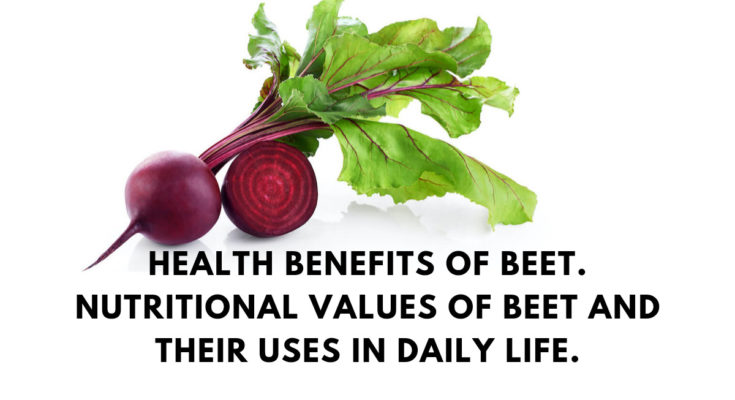BEET
Beet, also known as beetroot or Beta vulgaris, is a vegetable that is widely cultivated and consumed around the world. It has a distinctive deep red color and a sweet, earthy flavor. Beets are often used in cooking and can be eaten raw, roasted, boiled, pickled, or juiced. They are rich in nutrients such as fiber, folate, manganese, potassium, and vitamin C.
Here are some key points about beets:
1. Nutritional Benefits: Beets are low in calories and fat but high in various vitamins, minerals, and antioxidants. They are particularly rich in folate and manganese. Beets also contain dietary fiber, which aids digestion and promotes a healthy gut.
2. Health Benefits: Consuming beets has been associated with several health benefits. The nitrates present in beets may help lower blood pressure and improve athletic performance. They also contain compounds called betalains, which have antioxidant and anti-inflammatory properties.
3. Culinary Uses: Beets are versatile and can be used in various culinary preparations. They can be boiled, roasted, or steamed and then used in salads, soups, stews, or side dishes. Beets are often pickled, which enhances their flavor and extends their shelf life. Additionally, beet juice is a popular ingredient in smoothies and juices.
4. Beet Greens: The leafy tops of beets, known as beet greens, are also edible and highly nutritious. They are similar to other leafy greens like spinach or Swiss chard and can be sautéed, steamed, or added to salads for an extra nutritional boost.
5. Natural Food Coloring: Beets are commonly used as a natural food coloring agent. Their vibrant red pigment is often used to add color to dishes, baked goods, and even natural dyes.
6. Storage and Selection: When selecting beets, look for firm roots with smooth skin and vibrant color. The greens should be fresh and crisp. Beets can be stored in the refrigerator for up to a few weeks. It’s advisable to remove the greens before storage to prevent them from drawing moisture from the roots.
7. Potential Side Effects: While beets are generally safe to eat, some people may experience a condition called beeturia, where the urine or stool may turn pink or red after consuming beets. This is harmless but can be surprising. Beets are also relatively high in oxalates, which may contribute to the formation of kidney stones in susceptible individuals when consumed in large quantities.
Remember to consult with a healthcare professional or nutritionist if you have any specific concerns about incorporating beets into your diet, especially if you have any underlying health conditions or dietary restrictions.
HEALTH BENEFITS:-
Beets are a root vegetable that are high in vitamins, minerals, and fiber, and offer numerous health benefits. Here are some of the potential benefits of consuming beets:
1. Lower blood pressure: Beets contain nitrates, which can help relax and dilate blood vessels, leading to lower blood pressure.
2. Improved athletic performance: The nitrates in beets may also enhance athletic performance by increasing blood flow and oxygen delivery to the muscles.
3. Increased endurance: Studies have shown that beet juice may increase endurance and help athletes perform at a higher level for longer periods of time.
4. Improved digestion: Beets are a good source of fiber, which can promote regular bowel movements and improve digestion.
5. Anti-inflammatory properties: Beets contain betalains, which are compounds with anti-inflammatory properties that may help reduce the risk of chronic diseases.
6. Boosts brain health: Beets are high in nitrates which are converted to nitric oxide that helps to dilate blood vessels and increase blood flow to the brain, promoting cognitive function and overall brain health.
7. Helps to detoxify liver: Beets contain betaine, which helps to support liver function and aid in the body’s natural detoxification process.
Overall, beets are a nutritious vegetable that offer a variety of potential health benefits.
NUTRITIONAL FACTS OF BEET:-
Beets are a nutritious root vegetable that are low in calories and high in several important nutrients. Here are some nutritional facts about beets:
- Beets are a good source of fiber, with 3.4 grams of fiber per cup (136 grams).
- They are also a good source of folate, with 34% of the daily recommended intake in one cup.
- Beets contain a variety of vitamins and minerals, including vitamin C, potassium, manganese, and iron.
- They are high in nitrates, which can help lower blood pressure and improve exercise performance.
- Beets also contain betaine, a compound that may reduce the risk of several chronic diseases.
- They are low in fat and calories, with only 58 calories per cup (136 grams).
Here is a detailed nutritional breakdown of 1 cup (136 grams) of cooked beets:
- Calories: 58
- Carbohydrates: 13 grams
- Fiber: 3.4 grams
- Protein: 2.2 grams
- Fat: 0.2 grams
- Vitamin C: 6.7 mg (11% of the Daily Value)
- Folate: 136 mcg (34% of the Daily Value)
- Vitamin B6: 0.1 mg (6% of the Daily Value)
- Potassium: 442 mg (13% of the Daily Value)
- Magnesium: 31.5 mg (8% of the Daily Value)
- Phosphorus: 54.4 mg (5% of the Daily Value)
- Manganese: 0.3 mg (15% of the Daily Value)
- Iron: 1.3 mg (7% of the Daily Value)
Overall, beets are a nutritious and healthy addition to your diet. They can be enjoyed raw, cooked, or pickled and can be incorporated into a variety of dishes, including salads, smoothies, and roasted vegetables.Beets are also high in nitrates and contain other beneficial compounds like betaine, which have potential health benefits.
HOW TO USE BEET IN DAILY LIFE
Beets are a versatile vegetable that can be used in a variety of dishes. Here are some ways to use them:
Roasted Beets: Cut beets into wedges, toss them with olive oil, salt, and pepper, and roast them in the oven until tender. Roasted beets can be enjoyed as a side dish or added to salads.
Beet Salad: Combine roasted beets with arugula, goat cheese, and walnuts for a delicious and nutritious salad.
Beet Hummus: Puree cooked beets with chickpeas, tahini, lemon juice, and garlic for a colorful and flavorful dip.
Beet Soup: Blend cooked beets with vegetable broth, onion, and spices for a hearty and healthy soup.
Beet Smoothie: Blend cooked beets with frozen berries, spinach, and almond milk for a nutritious and tasty smoothie.
Pickled Beets: Slice cooked beets and pickle them with vinegar, sugar, and spices for a tangy and flavorful side dish.
Beet Chips: Thinly slice beets, toss them with olive oil and salt, and bake them in the oven until crispy for a healthy and delicious snack.
Overall, beets can be enjoyed in many ways, both cooked and raw. Experiment with different recipes to find your favorite way to use this nutritious vegetable.



